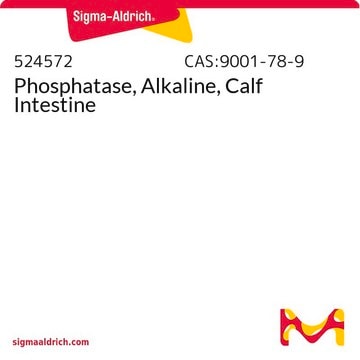Application
Alkaline phosphatase can be used to dephosphorylate casein and other proteins. Alkaline phosphatase may be also be used to dephosphorylate the 5′-termini of DNA or RNA to prevent self-ligation. DNA or RNA can also be tagged with radiolabeled phosphate (via T4 polynucleotide kinase) after dephosphorylation with alkaline phosphatase..
Alkaline phosphatase is usually conjugated to antibodies and other proteins in immunological techniques such as ELISA, Western blotting, and immunohistochemistry. It is routinely used to dephosphorylate proteins and nucleic acids. It may be used for protein labeling when high sensitivity is required. Alkaline phosphatase may be also be used to dephosphorylate the 5′-termini of DNA or RNA to prevent self-ligation. DNA or RNA can also be tagged with radiolabeled phosphate (via T4 polynucleotide kinase) after dephosphorylation with alkaline phosphatase. Product P7923 has been used in a novel screening strategy for nitrilase-producing strains.
High specific activity grade recommended for antibody and protein conjugation.
The enzyme has been used to develop a highly sensitive immunoassay for determining one thousandth of an attomole (1 zeptomole) of alkaline phosphatase. It has been used in an immunoassay of proinsulin. It has also been used to pretreat ISG (immature secretory granule) membranes to study the phosphorylation of proteinacous components in it.
Biochem/physiol Actions
Alkaline phosphatase, from bovine intestinal mucosa, is most stable in the pH range 7.5-9.5. The enzyme has a broad specificity for phosphate esters of alcohols, amines, pyrophosphate, and phenols. It requires zinc, and magnesium or calcium divalent ions for activity.
The enzyme has a broad specificity for phosphate esters of alcohols, amines, pyrophosphate, and phenols. It is routinely used to dephosphorylate proteins and nucleic acids.
The enzyme is a glycoprotein containing approximately 12% carbohydrate (6% hexoses and 6% other neutral sugars). Each molecule of alkaline phosphatase contains four zinc atoms and four disulfide bridges. Maximal activity with alkaline phosphatase is achieved in the presence of magnesium. It catalyzes the hydrolysis of phosphate monoesters such as: p-nitrophenyl phosphate, phenyl phosphate, phenolphthalein phosphate, α-glycerol phosphate, β-glycerol phosphate, 2-phosphorylglycerate, triosephosphate, glucose-6-phosphate, glucose 1-phosphate, fructose 1-phosphate, fructose 6-phosphate, adenosine 5-phosphate adenosine 3-phosphate, phosphoenolpyruvate, and β-nicotinamide adenine dinucleotide phosphate. Arsenate, cysteine, iodine, inorganic phosphate, pyrophosphate, diisopropyl phosphate, triphenylphosphate, diisopropyl fluorophosphate, and L-phenylalanine are some of the strong inhibitors of alkaline phosphatase.
Physical properties
Bovine intestinal alkaline phosphatase is a dimeric, membrane-derived glycoprotein. At least three isoforms exist, which typically possess two N-linked and one or more O-linked glycans per monomer.
Bovine intestinal alkaline phosphatase is a dimeric, membrane-derived glycoprotein. At least three isoforms exist, which typically possess two N-linked and one or more O-linked glycans per monomer.2 The enzyme requires zinc, and magnesium or calcium divalent ions for activity.
Unit Definition
1 DEA-Einheit hydrolysiert 1 μmol 4-Nitrophenyl-Phosphat pro Minute bei pH 9.8 und 37 °C.
Physical form
Solution in 40% glycerol containing 6 mM Tris/HCl, 6 mM MgCl2 and 0.12 mM ZnCl2, ~pH 7.6
Analysis Note
Package sizes are based on DEA units
Protein determined by biuret.







